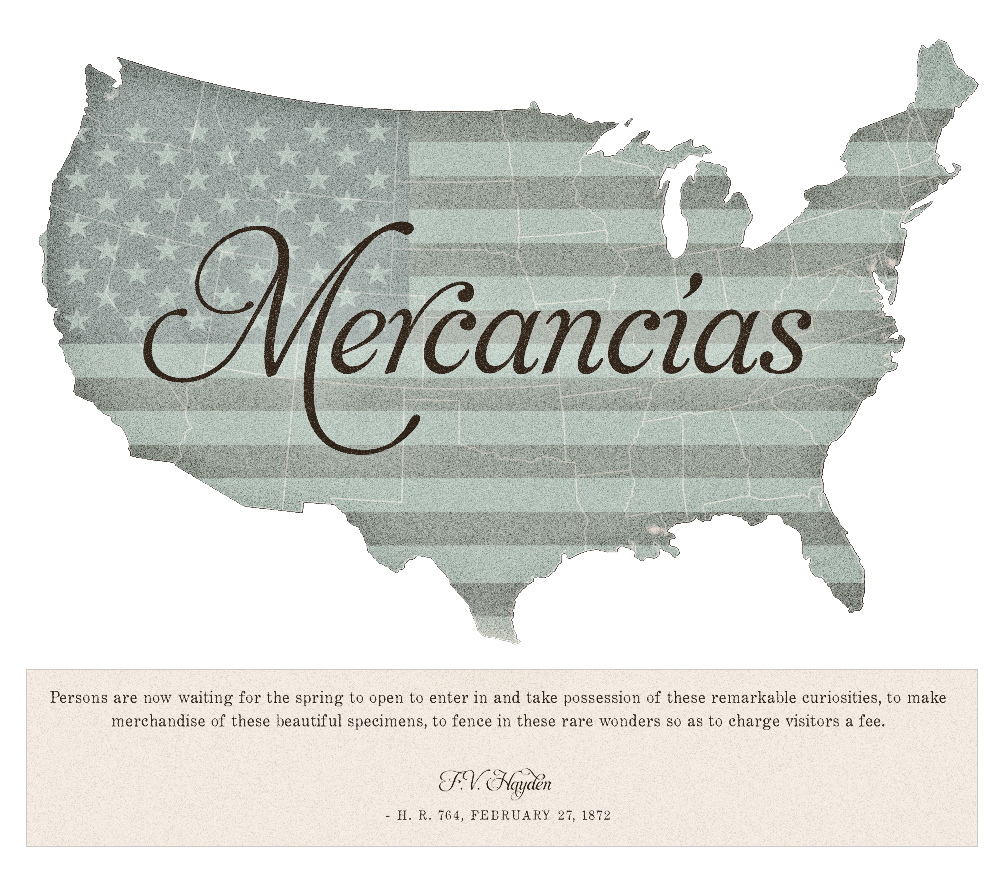Driving across the high plains of Wyoming, I looked at a map and for the first time, realized the size of Yellowstone National Park. It is winter and restricted access to the park left it off our travel plans, but I was captivated by the acreage it occupied. Claire was sitting shotgun, and I asked her to get some intel on the topic.
While reporting facts and statics on the property courtesy of an AT&T data plan, she read to me a memorable quote. The text was written by an early advocate for the preservation of the park. In addition to being written in the verbose and upright style of the 1800’s, it reeked of the optimism and the moral high ground so many intellectuals and common men took in that era when committing their convictions to the page. It was the phrase “to make merchandise” that caught both Claire’s attention and mine. As she read it, she smiled and gave it emphasis as she read. We nodded to the scene outside our windshield and at notion that a word so often used as a noun could so succinctly be used as a verb to swiftly sum up the tendencies of the American Process.
Merchandise. As both a noun and a verb, it has, in so many ways come to define our way of life. We buy and we sell. We buy and we sell everything – from the physical to the ethereal: we sell the granite peaks inside Yellowstone. The park has been protected, I am thankful for that. And for that, it costs $25 to enter. And far more affecting, we sell it’s intangibles too. We sell it’s sentiment, the nostalgia, and it’s ideals. We sell in on our t-shirts and keychains, and we sell it in our legislation and our collective common national identity.
In many ways, this realization is a metaphor not just our national parks, but the entire country and our way of life. America is one big gift shop. We protect (often from ourselves) sacred places, events, and experiences, and then we sell it all back to ourselves. As I am writing this, Claire and are looking at a link shared by my friend Kendall, (Who I should mention is a like minded fellow, and knows Claire and I are planning a wedding.) The link is for a wedding contest. A $100,000 wedding can be won, with the money being spent to countless sub-contractors, products, and services, not the least being sold are the wares of the sponsoring company. Be sure to note that each entrant has a convenient link their wedding registry, so you can buy them gifts from the contest sponsor.
Exhibit A: ultimateweddingcontest.com
This process I steer clear for my own personal tastes, but I don’t pass judgment beyond my own life. It’s not me, but it is the way things have come to be, and for better and for worse, it keeps this country going for now. The costs of life this way are severe to my personal constitution but to sit here and complain would be worse then trying to understand and live within these social norms and aesthetics that so often shamelessly turn us all into merchandise. There are some good ideas happening, and lessons to be learned in the almighty quest for selling everything that we can get our hands, hearts, and minds on.
Mercancías. What made this realization with Claire and the vast Wyoming expanse surrounding us on that day so provocative, was not the well worn notions of capitalism. What made the words she read so haunting to me came to better understanding since that drive. While listening to radio today, the debate on immigration was brought to light for me: Not only do we protect (often from ourselves) sacred places, events, and experiences, and then we sell it all back to ourselves. We protect these assets – what gives America it’s collective soul – and we sell it to whoever is the highest bidder.
For the first time, I saw the boundaries of the United States as some must have seen the boundaries of Yellowstone more than one hundred years ago. The sentiments and motives for protecting national parks seem to be strangely and sometimes perversely applied to the county as a whole today. These words, written in 1872 by F. V. Hayden in passionate defense of the establishment of Yellowstone National Park, sound haunting when compared to today’s ideas of immigration.
“Persons are now waiting for the spring to open to enter in and take possession of these remarkable curiosities, to make merchandise of these beautiful specimens, to fence in these rare wonders so as to charge visitors a fee, as is now done at Niagara Falls, for the sight of that which ought to be as free as the air or water. “
Exhibit B: www.immigrationpolicy.org/just-facts/
American is a gift shop. We are open for business. We have merchandise on our shelves. And we are selling our hearts out. While supplies last.
